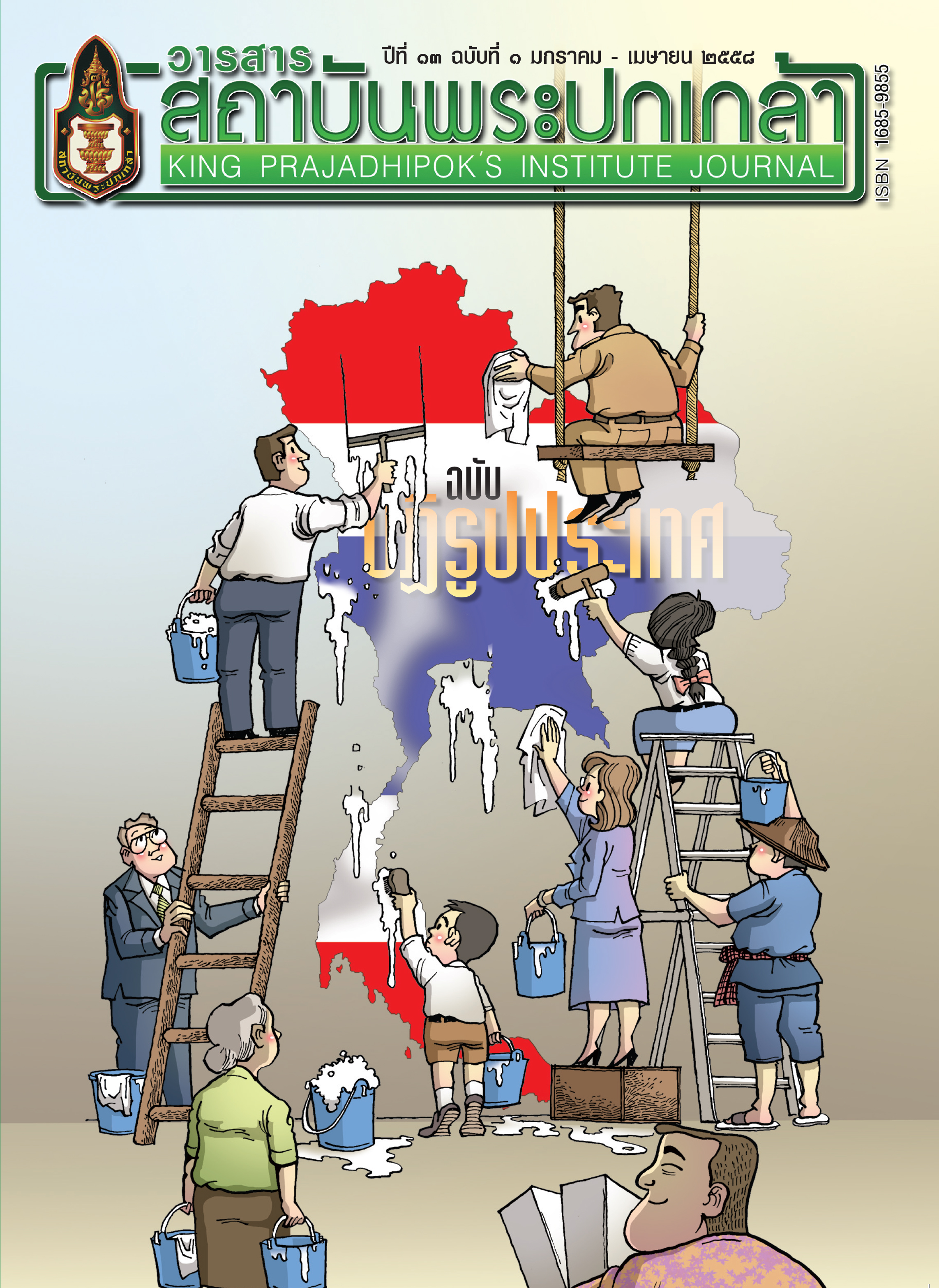การรวมศูนย์อำนาจและการกระจายอำนาจ กับการบริหารราชการแผ่นดินไทย:การทบทวนแนวคิดข้อถกเถียงและข้อพิจารณาเพื่อการปฏิรูป
Main Article Content
บทคัดย่อ
บทความนี้มุ่งสำรวจถึงแนวคิดที่เกี่ยวข้องกับการรวมศูนย์อำนาจและการกระจายอำนาจในฐานะที่เป็นเครื่องมือสำคัญต่อการออกแบบระบบการบริหารราชการแผ่นดินในสังคมหนึ่งๆ โดยพยายามจะนำเสนอข้อถกเถียงว่า แนวคิดการรวมศูนย์อำนาจและการกระจายอำนาจนั้นมิใช่แนวคิดที่อยู่ขั้วตรงข้าม แต่แนวคิดทั้งสองนั้นมีความสำคัญยิ่งต่อการจัดสรรและแบ่งปันอำนาจภายในรัฐเพื่อใช้ในการจัดโครงสร้างและออกแบบระบบการดำเนินงานของกลไกรัฐในส่วนต่างๆคำถามสำคัญจึงไม่ใช่เรื่องแนวคิดใดดีกว่ากัน หากแต่เป็นเรื่องการสร้างความสมดุลและจัดสัมพันธภาพที่เหมาะสมระหว่างกลไกหรือโครงสร้างในแบบรวมศูนย์อำนาจกับในแบบกระจายอำนาจต่างหาก และคำถามนี้ควรจะเป็นศูนย์กลางของการถกเถียงในการแสวงหารูปแบบแนวทางต่อการปฏิรูประบบบริหารราชการแผ่นดินของไทย ซึ่งในที่นี้เห็นว่า หัวใจสำคัญของการปฏิรูปได้แก่การมุ่งจัดสัมพันธภาพเพื่อกำหนดบทบาทและกลไกในการประสานงานและการดำเนินงานร่วมกันที่เหมาะสมของกลไกรัฐระดับต่างๆ ทั้งนี้ หลักผลประโยชน์แห่งชาติควรจะเป็น
แกนกลางของการพิจารณากลุ่มภารกิจซึ่งจะต้องนำไปสู่การกำหนดโครงสร้างกลไกรัฐในแบบรวมศูนย์อำนาจที่รัฐส่วนกลาง ขณะที่หลักการเริ่มต้นที่ท้องถิ่นควรจะเป็นหลักสำคัญในการจัดสรรแบ่งปันอำนาจและภารกิจต่างๆ ไปยังโครงสร้างในส่วนอื่นๆ ภายใต้หลักการกระจายอำนาจ
Article Details
@ 2020 King Prajadhipok's Institute The Government Complex Commemorating All Right Reserved.
เอกสารอ้างอิง
จรัส สุวรรณมาลา. ๒๕๓๘. ปฏิรูประบบการคลังไทย. กรุงเทพฯ: สำนักงานกองทุนสนับสนุนการวิจัย.
นครินทร์ เมฆไตรรัตน์, วสันต์ เหลืองประภัสร์ และปานรัตน์ นิ่มตลุง. ๒๕๕๓. “การปรับเปลี่ยนกลไกเชิงสถาบันเพื่อเสริมสร้างสมรรถนะในการทำงานด้านเด็กขององค์กรปกครองส่วนท้องถิ่น.” รายงานการวิจัยเสนอต่อกองทุนเพื่อเด็กแห่งสหประชาชาติ (UNICEF).
โภคิน พลกุล. “หลักเกี่ยวกับการจัดระเบียบบริหารราชการ,” รัฐสภาสาร สิงหาคม ๒๕๒๘.
วสันต์ เหลืองประภัสร์. ๒๕๕๓. “การบริหารปกครองกับความสัมพันธ์ระหว่างหน่วยงานของรัฐ.” ใน การบริหารปกครองสาธารณะ (Public Governance): การบริหารรัฐกิจในศตวรรษที่ ๒๑. อัมพร ธำรงลักษณ์ บก. กรุงเทพฯ: โครงการตำราและสิ่งพิมพ์คณะรัฐศาสตร์ มหาวิทยาลัยธรรมศาสตร์.
วสันต์ เหลืองประภัสร์. “สองคลื่นแห่งการปฏิรูประบบราชการไทย: ๑๕ ปีของความเปลี่ยนแปลงในเชิงสถาบันทางการเมือง-การบริหารไทย, ๒๕๓๕ – ๒๕๔๙ (Public Sector Reform in Thailand: 15 Years of Changes within the Thai Politico-Administrative Institutions, 1992 – 2006).” รัฐศาสตร์สาร. ปีที่ ๓๔ ฉบับที่ ๒, ๒๕๕๖.
วสันต์ เหลืองประภัสร์. ๒๕๕๗. “โครงการการสังเคราะห์ตัวแบบเชิงทฤษฎีและการบริหารจากผลการดาเนินโครงการความร่วมมือเพื่อแก้ปัญหาความยากจน การพัฒนาสังคม และสุขภาวะ” รายงานการวิจัย เสนอต่อ สำนักงานกองทุนสนับสนุนการวิจัย.
วัจนาถ วังตาล. ๒๕๓๖. “วิเคราะห์กฎหมายการปกครองท้องถิ่นไทยในรูปแบบสุขาภิบาล.” วิทยานิพนธ์นิติศาสตร์มหาบัณฑิต คณะนิติศาสตร์ มหาวิทยาลัยธรรมศาสตร์.
อิสสระ นิติทัณฑ์ประภาศ. “ระบบกระจายอำนาจของฝรั่งเศส,” เอกสารประกอบการสัมมนาทางวิชาการเรื่องความสัมพันธ์ในทางกฎหมายระหว่างราชการบริหารส่วนกลางกับราชการบริหารส่วนท้องถิ่น จัดโดย สมาคมกฎหมายมหาชนแห่งประเทศไทย วันที่ ๑๖ พฤศจิกายน ๒๕๓๓. (อัดสำเนา).
อุดม รัฐอมฤต. ความเป็นนิติบุคคลของรัฐ. ม.ป.ป. http://law.tu.ac.th/lct/download/lecture/la250_state.htm (เข้าถึงวันที่ ๑ ตุลาคม ๒๕๕๒).
เอนก เหล่าธรรมทัศน์. ๒๕๔๓. เหตุอยู่ที่ท้องถิ่น: ปัญหาการเมืองการปกครองที่ระดับชาติอันสืบเนื่องจากการปกครองท้องถิ่นที่ไม่เพียงพอ. กรุงเทพฯ: ศูนย์ศึกษาและพัฒนาการปกครองท้องถิ่น มหาวิทยาลัยธรรมศาสตร์.
Bogdanor, Vernon. 1999. Devolution in the United Kingdom. Oxford: Oxford University Press.
Fenny, Ron. 2000. Essential Local Government 2000, 9th edition. London: LGC Information.
Hein, Carola and Philippe Pelletier, eds. 2006. Cities, Autonomy, and Decentralization in Japan. Abingdon, Oxon: Routledge.
Heywood, Andrew. 2002. Politics, 2nd edition. London: Palgrave.
Humes IV, Samuel. 1991. Local Governance and National Power: A Worldwide Comparison of Tradition and Change in Local Government. Hertfordshire: Harvester Wheatsheaf.
Kindleberger, Charles P. 1996. Centralization versus Pluralism: A Historical Examination of Political-Economic Struggles and Swings within Some Leading Nations. Copenhagen: Handelsh jskolens Forlag.
Lijphart, Arend. 1999. Patterns of Democracy: Government Forms and Performance in Thirty-Six Countries. New Haven: Yale University Press.
Manor, James. 1999. The Political Economy of Democratic Decentralization. Washington, D.C.: The World Bank.
March, James G. and Johan P Olsen. 1989. Rediscovering Institutions: The Organizational Basis of Politics. New York: Free Press.
Mengu, Moses D. 1990. “Centralization versus Decentralization Policies in Developing Countries: An Overview of Problems and Prospects.” In Decentralization and Regional Transformation, pp. 139 – 151. The Nordic Institute of Regional Research (NordREFO).
Michio, Muramatsu. 1997. Local Power in the Japanese State. Translated by Betsey Scheiner and James White. Berkley: University of California Press.
Muscat, Robert J. 1994. The Fifth Tiger: A Study of Thai Development Policy. Armonk. N.Y.: M.E. Sharpe.
Norton, Alan. 1994. International Handbook of Local and Regional Government: A Comparative Analysis of Advanced Democracies. Aldershot, Hants: Edward Elgar.
Parker, Andrew. 1995. “Decentralization: The Way Forward for Rural Development?,” Policy Research Working Paper 1475. Washington, D.C.: World Bank.
Rhodes, R.A.W., Sarah A. Binder, and Bert A. Rockman. 2006. The Oxford Handbook of Political Institutions. Oxford: Oxford University Press.
Samudavanija, Chai-Anan. 2002. Thailand: State-Building, Democracy and Globalization. Bangkok: IPPS.
Schmidt, Vivien A. 1990. Democratizing France: The Political and Administrative History of Decentralization. Cambridge: Cambridge University Press.
Treisman, Daniel. 2007. The Architecture of Government: Rethinking Political Decentralization. Cambridge: Cambridge University Press.
Wilson, David and Game, Chris. 2002. Local Government in the United Kingdom, 3rd ed.
London: Macmillan.


